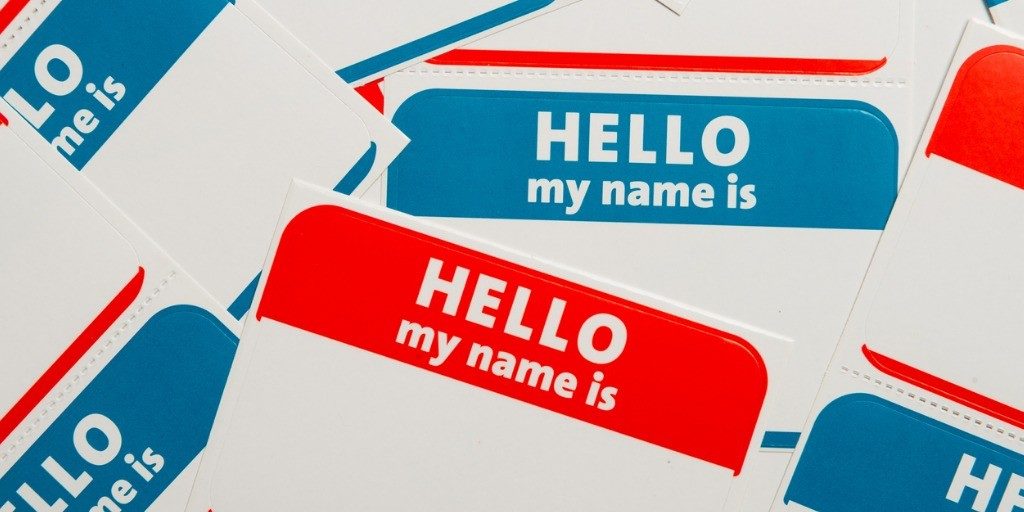Why using people’s names can jumpstart employee engagement & business results

This past weekend, I was approaching the last sprint in an intense spin class when my energy started flagging. Some women might glow, but I was a sweaty, endorphin-happy mess from the previous 43 minutes of climbs, jumps and all-out high heart rate hijinks. Was ready to start winding down when the instructor, Bejay, name-checked me and a few others. I felt special, like someone else cared about my class performance. That simple action caused me to dig down harder and finish at full blast.
The moral of the story, supposing that all posts should have one, is that names matter. Highlighting individuals by name can have tremendous power in driving engagement and positive results in your professional and personal life. Benefits include:
1) Builds deeper connections. When you speak to a group in the collective, there can be a subconscious divide. You know, “us” versus “them.” Even the use of “we” can sound distant if you don’t have a level of personal connection. It’s easy to stand apart when you’re learning something new at a seminar, hearing a presentation or attending a networking event when there’s not a familiar face in sight. However, the moment you start to use someone’s name, it becomes personal. Doing so demonstrates respect. You cared enough to learn and use their name, which draws individuals deeper into conversations or situations. The same is true for brands developing relationships with their key audiences. With social media, customer analytics and email marketing, it’s easy to personalize a response or present a compelling offer that feels customized for your tastes. Just ask Amazon, which predicts the books I’d like to read and household products that need to be ordered with terrific accuracy. And I love them for being such a helpful know-it-all, making my busy life a bit easier.
2) Increases motivation. Scientists have found that brain activation spikes when someone uses your name. You pay greater attention to what’s being communicated. People will work that much harder when they, and their efforts are being noticed.
Full disclosure, my unique name caused some sensitive childhood moments. On a popular children’s television show called Romper Room, the host used a “magic mirror” to call out kid’s names from the viewing audience. She went through the regular rotations of Jennifer’s, Karen’s and Amy’s and even my brothers’ more generic names, Robert and Bruce, made on the list. I so wanted to be included. But there was a scarcity of Shira’s in the U.S. back in the 70’s and 80’s, and my moniker never made the cut. Worst of all was when substitute teachers tried to perform roll-call. I was out sick one day in eleventh grade when Mrs. McCaskill, who had to be pushing her mid-eighties, sat in for our normal history teacher. Somehow Shira Miller got butchered into “Smyra,” which she proceeded to call out loudly, numerous times until the room dissolved into laughter. Yup, that delightful nickname stuck around until graduation. But I digress. When someone takes the time to learn my name, and (bonus points!) pronounce it correctly, I’m appreciative and enter the conversation with a greater level of interest.
3) Promotes employee engagement. People want to be seen, to know that their hard work and extra efforts are noticed and recognized. And I urge companies and organizations of all sizes to do this as much as possible. When we hold coffee chats with employees, department heads are asked in advance who should be recognized by name. Our employee newsletter highlights individuals with service anniversaries, promotions and includes stories that feature insights from multiple people. Last fall, when Hurricanes Harvey and Irma hit, our teams worked intently to keep employees safe during the storm and then post-event recovery efforts to replenish product inventory levels, handle member inquiries, stay connected with Dunkin’ brands, restore deliveries to the Dunkin’ franchisees we serve and donate goods like 30,000 water bottles to the American Red Cross. Rather than just refer to the general team, NDCP took time to recognize rock stars like John Ditmars, Julie Reed, Melissa Cassell, Jay Elliott, Melanie King, Emily Fuller and more by name. (Hey, you’ve got to practice what you preach, right?)
Let’s say you are totally on board with the importance of names, but not-so-great at retaining that kind of information. Check out these helpful tips for remembering names from executive speaking expert Chris Witt of Witt Communications, LLC. I try to jot notes about names when time permits, repeat them a few times in conversation for reinforcement and come up with an association (i.e. meeting a new person named Sandy, which is also the name of my sister-in-law, and locking that reference in for strong recall.)
What kind of impact have you seen from using people’s names? Ever have someone call yours out in a positive way in a public forum? Finally, in the process of writing this post, somehow the lyrics from “Say My Name,” by Destiny’s Child have gotten stuck in my brain. Any advice for clearing that out?
